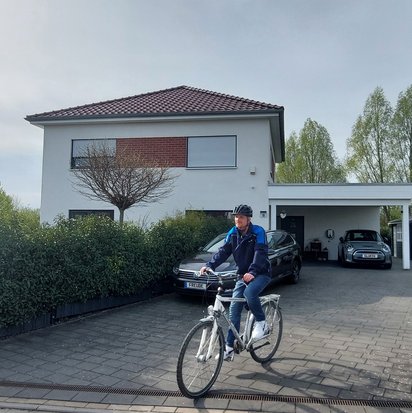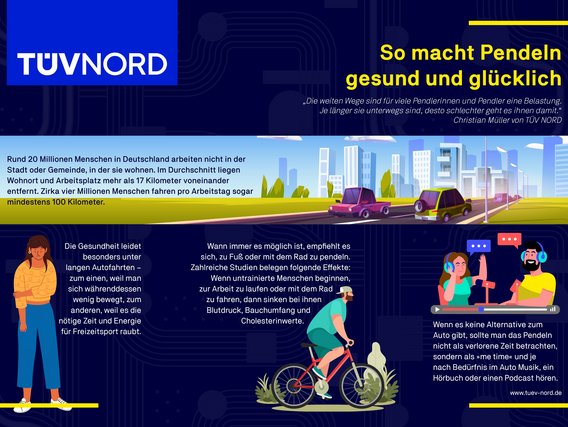How commuting makes you healthy and happy
People & Empowerment: Ein weiter Weg zur Arbeit muss kein Nachteil sein – wenn man die Zeit gut nutzt, weiß Christian Müller von TÜV NORD zu berichten.

People & Empowerment: Ein weiter Weg zur Arbeit muss kein Nachteil sein – wenn man die Zeit gut nutzt, weiß Christian Müller von TÜV NORD zu berichten.

The number of commuters is increasing, reported the Federal Institute for Research on Building, Urban Affairs and Spatial Development last year. Around 20 million people in Germany do not work in the city or municipality in which they live. On average, their home and workplace are more than 17 kilometers apart. Around four million people even travel at least 100 kilometers per working day.
The long distances are a burden for many commuters. The longer they travel, the worse they feel. But it doesn't have to be that way. “It also depends on how you get around,” says Christian Müller from the Medical-Psychological Institute of TÜV NORD in Cologne.
Health suffers particularly from long car journeys - firstly because you don't get much exercise during them, and secondly because it robs you of the time and energy you need for leisure sports. That's why psychologist Müller recommends commuting on foot or by bike whenever possible: “It's worth leaving the car behind.”

This was proven by a field study published in Austria in 2020. A research group led by cardiologist Josef Niebauer persuaded employees of the Salzburg regional hospitals to cycle, walk or take the bus or train to work instead of driving. As a result, the clinic employees became significantly fitter within a year, as documented by measurements on a bicycle ergometer. Further investigations revealed that When untrained people start walking or cycling to work, their blood pressure, abdominal girth and cholesterol levels drop.
Numerous studies have shown similar - albeit mostly moderate - effects. A Finnish study showed that active commuting reduced the risk of stroke almost as much as moderate recreational sport, but less than intensive sport. Another Finnish study came to the conclusion that additional exercise of around two kilometers per working day had only a minor effect.
“It depends on how long and how hard you exert yourself,” explains Christian Müller. The environment also plays a role: is the air good, does the path lead through nature? A high concentration of particulate matter reduces the health benefits of physical activity. And well-being increases, especially if the route runs through greenery or along water.
But what if there is no alternative to the car? Then there is still the option of not seeing commuting as lost time, but as “me time”. This is how Shani Pindek, a stress researcher at the University of Haifa in Israel, puts it. She describes commuting as a kind of “third space” that can fulfill two functions: It separates as a buffer between professional and private life. And it creates the space and time to fulfill needs that are neglected in everyday life: to relax, to be entertained or to further one's education.
Christian Müller from TÜV NORD recommends listening to music, an audio book or a podcast in the car, depending on your needs, “to create little rituals that enrich your everyday life.” Commuting can even promote satisfaction, says the psychologist. However, it is important to ensure that the conversation - be it a phone call or an exciting audio book - does not distract from the traffic.
A survey in three Swedish cities confirmed that if everyday routines work and positive feelings predominate, people are satisfied with their commute. And this can even contribute to happiness in life.
Founded over 150 years ago, we stand for security and trust worldwide. As a knowledge company, we have our sights firmly set on the digital future. Whether engineers, IT security experts or specialists for the mobility of the future: in more than 100 countries, we ensure that our customers become even more successful in the networked world.